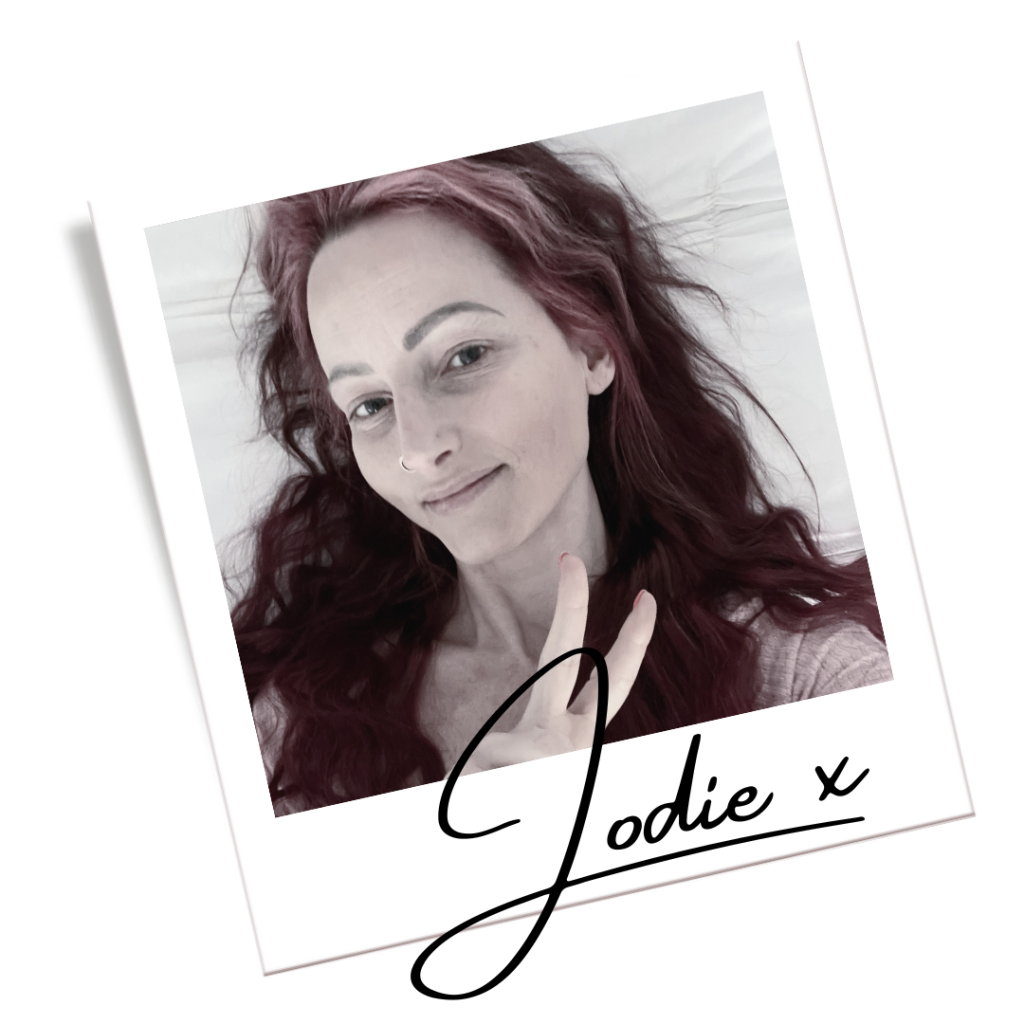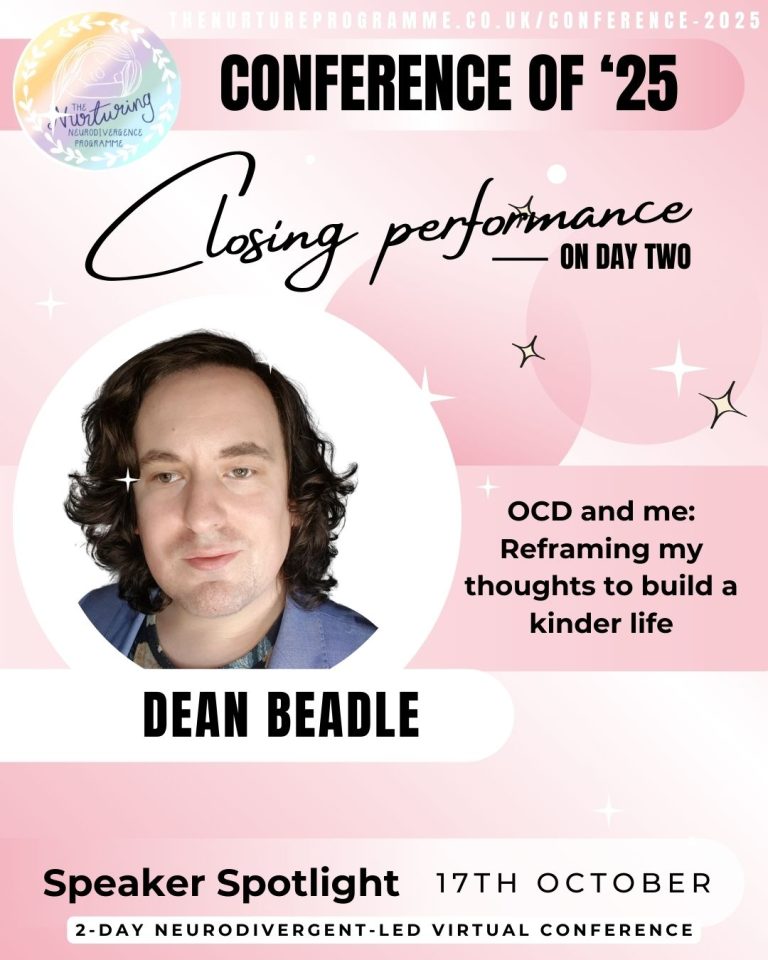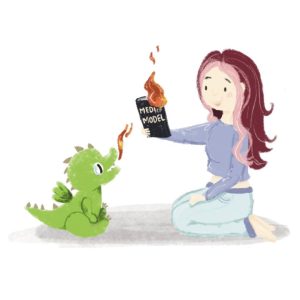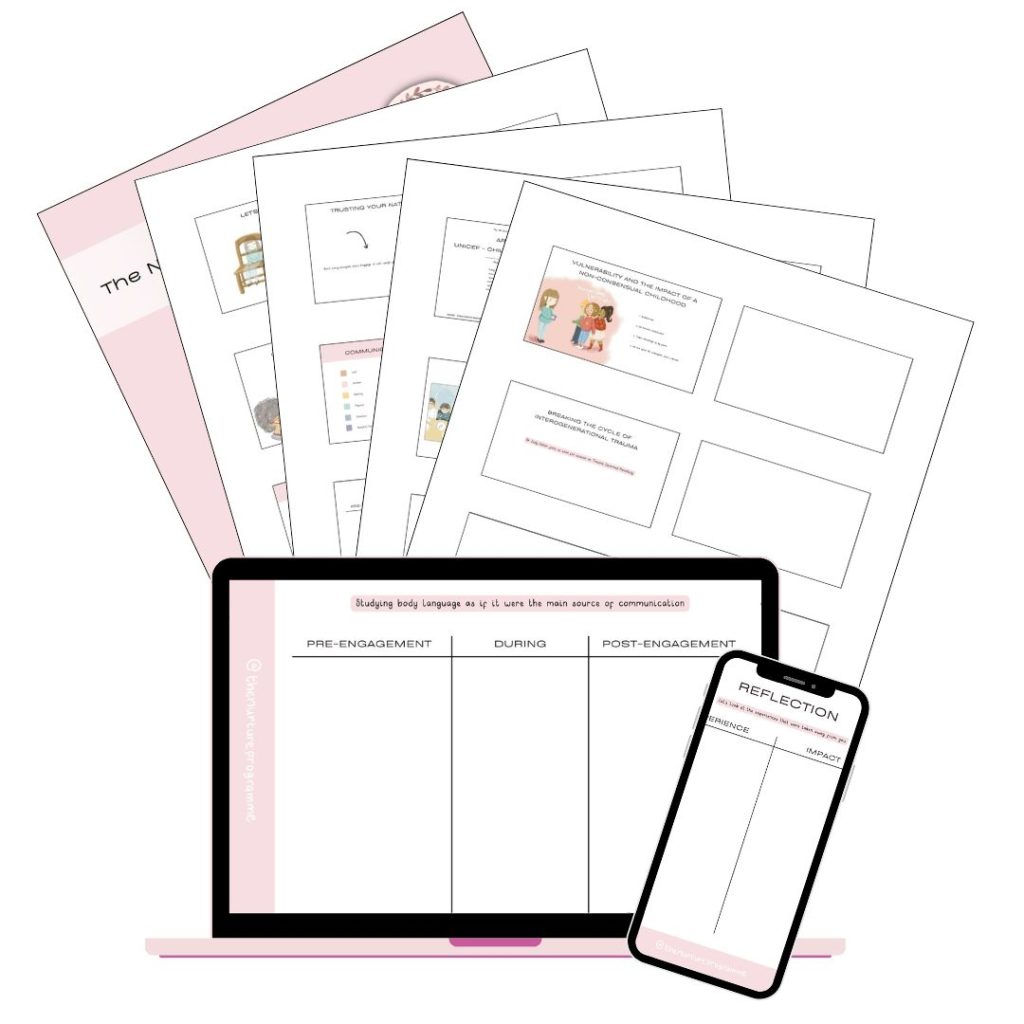


We are so excited to launch our 2025 Conference by The Nurture Programme.
Neurodivergence & Trauma: The Big Beautiful Reframe.
Over the last four or so years we have built a beautiful community of people and if you join us this October we will be one more person, carer, professional human being closer to helping more of you grow from crisis to calm and to learn, work or live, in safety.
Safe spaces for you to be Authentic. Safe for you to live and learn without fear or judgement, or anxiety about whether or not you are accepted; confident that your own uniqueness is understood and that you are valued and celebrated for who you truly are!
We are here with a unique lineup, waiting for you to join us, to grow with us, to be part of our Calm, Connection & Co-Regulation
Neurodivergence & Trauma: The Big Beautiful Reframe
After the reframe comes repair, rest, and reconnection.
For too long, Neurodivergence has been misunderstood. This conference offers a bold, compassionate reframe: Being neurodivergent does not mean we are a disorder to be fixed, but humans who need something a little different. But reframing is just the beginning.
This event is an invitation to move beyond labels — to explore how trauma and neurodivergence intersect without being conflated, and how we can offer care that doesn’t demand compliance but creates safety. Together, we’ll walk the path from misinterpretation to understanding, from survival to sovereignty. Through keynotes, workshops, lived-experience panels, and embodied practices, we’ll explore what it means to truly support those who are neurodivergent and ourselves — in a world that often asks too much and listens too little. Join us as we:
Reframe outdated narratives. Repair what misunderstanding has broken. Rest the overwhelmed nervous system. Reconnect with self, community, and compassion.
Whether you’re a parent, practitioner, educator, ND person or ally — this space is for you. Come for the insight. Stay for the healing.
Performing Presenter!

OCD & Me: Reframing my Thoughts to Build a Kinder Life
We are honoured to welcome back Dean Beadle for the third consecutive year!
Dean is our conference finale for a very important reason. Two full days of learning, sitting and concentrating can be overwhelming and his performances, although rooted in real life experiences that can be linked to trauma, are lighthearted, fun, comedic and brings a collective sense of calm to close our conference.
Every year Dean offers something new, something raw and something extremely relatable.
Don’t miss your chance to experience one of Dean’s live performances, with brand new content each year.

Trauma is not just what happened to us — it’s what got stored in our bodies when we were left alone with too much. It’s the invisible weight we carry when our nervous systems had to adapt to survive in environments that didn’t feel safe, seen, or supportive. And for so many Neurodivergent people, this is not the exception — it’s the backdrop of our lives.
Relational trauma — the kind that happens not in isolated incidents, but over time, in the space between people — wounds us at the level of connection. It’s what happens when we grow up walking on eggshells, masking our needs, or learning that love is conditional. It’s the ache of being misunderstood, misattuned to, or made to feel like “too much” or “not enough.” These patterns don’t just hurt — they shape the way we show up in the world, in our relationships, and with ourselves.
Intergenerational trauma runs even deeper. It’s what’s passed down through silences, through survival strategies disguised as parenting, through nervous systems that were never allowed to rest. It’s in the inherited shame, the hypervigilance, the avoidance of conflict, the fear of softness. And it is not our fault. But here’s the power: when we name it, we stop it from owning us.
Because healing from trauma — especially in the Neurodivergent context — isn’t about “getting over it” or “fixing” ourselves. It’s about coming home to ourselves. It’s about honouring the incredible adaptations our bodies made to keep us safe. It’s about gently peeling back the layers of protection, not to erase them, but to understand them — to meet them with fierce compassion.
Trauma isn’t who we are. But the way we survived it? That is a story of brilliance. And when we choose to turn toward our pain with presence, when we dare to disrupt the patterns handed to us, we become cycle-breakers. Bridge-builders. Hope-holders. We become the people we once needed — and the ones future generations will thank
Here is the complex truth: while trauma doesn’t cause neurodivergence, the lived experience of being Autistic, ADHD, OCD, or otherwise neurodivergent in a world that misunderstands, pathologises, and punishes these natural instincts can lead to trauma.
Imagine being constantly told you are manipulative, oppositional, or lazy — when in truth, your nervous system is screaming for agency. Imagine being forced to comply, to mask, to fit into systems that demand obedience over understanding. This is not just uncomfortable — it is traumatic.
Where trauma is a response to what has overwhelmed our system, Neurodivergence is an innate wiring that precedes those experiences. But once trauma enters the picture — particularly relational and intergenerational trauma — it can intensify demand avoidance, heighten nervous system sensitivity, and blur the lines between survival adaptations
and neurobiological responses. It becomes even harder to distinguish what is trauma-protection and what is neurodivergent expression.
That’s why healing matters — not to fix, but to create safety.
Because when they are met with curiosity instead of control, when they’re supported in autonomy rather than compliance, when the trauma that may have layered on top is gently untangled with compassion — that’s when the magic happens. That’s when neurodivergent people thrive.
They become the truth-tellers, the norm-breakers, the creatives, the cycle-breakers — not in spite of their wiring, but because of it.
It’s time we stop confusing trauma with difference, and start building systems that honour both.

HERE’S WHATS BACK AND NEW FOR 2025
- More workshop options
- Amazing hosting platform
- Downloadable note booklets
- bonus workshop/presentation
- bonus recorded panel discussions
- recordings available for 12 months

With the return of our two-day virtual neurodivergence conference ‘Neurodivergence & Trauma: The Big Beautiful Reframe’, this is all possible.
Back for its 5th year, The Nurturing Neurodivergence Programme is running again on 16th & 17th October 2025.
We will be joined by 10 internationally renowned speakers who will provide you with their experiential insight and give you the toolkit you need to understand the needs of any neurodivergent individuals you are living or working with.
With interactive workshops, case studies and the opportunity to ask our speakers questions based on your own challenges and experience, you will leave this conference feeling better equipped to help them to thrive and achieve their individual potential.
Our Aims & Values:
We are a Neurodivergent led organisation which aims to break down the stigma of disabilities, advocate for the importance of authenticity and autonomy, whilst supporting everyone’s right to self-advocacy.
Calm, Connection and Co-Regulation® are at the heart of EVERYTHING that we do.

What is this?
2 FULL days of Neurodivergence focused, and Neurodivergent led training!
Where is this being held?
It is all online so no travelling fees, hotel costs, long distance journeys or SOCIAL HANGOVERS!
Who is this for?
Basically EVERYONE but crucially for those who are involved in the teaching and support of, as well as those living with and caring for neurodivergent pupils, children or adults.
Do I have to be there LIVE?
Absolutely not! This is Online and Recorded for those who cannot make the live sessions. Recordings will be available to watch for 60 days after the event and usually take 2 weeks to be sent out, as they are professionally edited. Please note the workshops are interactive only and therefore cannot be recorded.
16th & 17th October 2025 at 9am-4pm BST. We have included speaker times in EST and AET for convenience.
Those caring for our Neurodivergent young people are often the most inspirational people in our young people’s lives. But whether they (you!) are a professional, parent or carer, they are probably overworked, largely underpaid and hugely under-appreciated. Access to training is potluck and access to the right kind of training is like finding a needle in a haystack.
So we are inviting you to come and take part in what we hope to be a life-changing event.
We will give you the opportunity to look through a different lens; one that brings about change, diversity, inclusion, acceptance and understanding. One where disability is not stigmatised by the judgment of a label.
We do NOT learn from TEXTBOOKS at The Nurture Programme®. We learn from those of us who are neurodivergent, who have lived experiences and seen first-hand what living in a world geared towards non-neurodivergence is like.

Children who are diagnosed or self-identified (because that is accepted just as much as a formal diagnosis) as Autistic, ADHD and PDA or other neurodivergence, are often misunderstood and sanctioned, with many being placed in isolation, excluded, sectioned, imprisoned or worse – all because they cannot manage within mainstream environments.
With long waiting list times for services, our children are being failed.
Often, these children and adults are simply misunderstood, and their needs aren’t being met. The education system has been built on the assumption that whilst differentiation is required, all children will fit into this mainstream picture and thrive. This isn’t the case, and the rise in need for EHCPs and support is a significant indication that if we always do what we have always done, then nothing will change.
It’s not surprising then that those unsupported children will grow into unsupported adults who are in crisis.
Our two-day conference is the opportunity for us ALL to come together and learn how best to engage, support and nurture the next generation.




ONE THAT IS NEURO-AFFIRMING, INCLUSIVE AND NEURODIVERGENT LED
2-day Virtual Conference on 16 & 17 October 2025
HOW TO BOOK:
Simply click the ‘Book my tickets’ button below, then click to buy tickets. You will be taken to a payment page to complete your purchase. Shortly after, you will receive an email with joining links for each day – please save these. We’ll also send email reminders leading up to the conference.


SPECIAL OFFER
GROUP BOOKINGS:
If you are an organisation that wishes to book multiple places for your staff, we have multi-place options available and we can invoice your organisation for payment. For full details on our group packages, simply click the button below to download our Group Booking Brochure. The brochure contains a booking form to secure your places.
Questions?

Absolutely, this is suitable for everyone, and we encourage all to learn from neurodivergent adults.
Of course, only one device per booking will be able to log-in but you can easily watch it off of the same device or even cast to the big screen.
If you are an organisation that wishes to book multiple places for your staff, we have a multi-place option available and we can invoice your organisation for payment. Please email admin@thenurtureprogramme.co.uk to enquire
Yes, you will receive a recordings within 7 days and it will be available for catchup for 60 days. The only segments that won’t be recorded are the workshops.
Once you have purchased tickets you will be sent an email confirmation with a link to register, please make sure that you do this even if you cannot attend live and prior to the event as you will need to register for the recording.
You don’t need to do anything. Once you have paid and registered, your email will be automatically added to the recording database and sent out within 14 days of the conference.
This conference is scheduled as a webinar and you can make use of the Q&A function which has anonymous options available.
No, just relax, in your home with a coffee and cake and fully immerse yourself in the most inclusive conference there is! Only our speakers will have their cameras on. There will be options to turn on your camera during the workshops, but this will be your choice.
Please do email jodie@
COMING SOON
No. Recordings will be made available this year for 12 months instead of 60 days.
Yes, we hope to run this conference year after year, and we will be introducing you to even more amazing guest speakers and neurodivergent people.
Absolutely, we will soon have a full list of speakers available, and their country of origin and specific timings for their time zone will be included.

